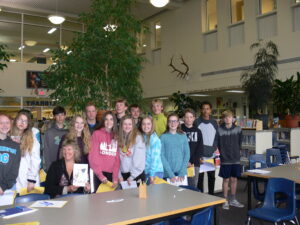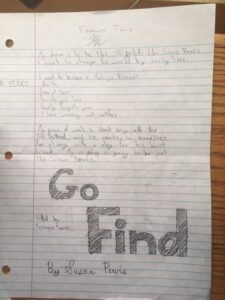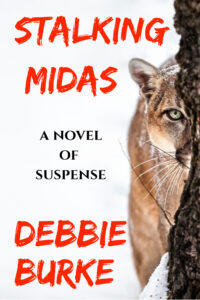by
It’s Tuesday morning at Columbia Falls Junior High School in northwest Montana. Approximately 75 eighth graders troop into the library where a massive glass wall faces Glacier National Park, shrouded in clouds that promise early snow. The students are gearing up for NaNoWriMo (National Novel Writing Month) led by English teachers Rubianna Masa and Cecilia Byrd-Rinck.
Since 2012, Rubianna has shepherded her students through the November writing marathon. “I will not lie,” she says. “Some of my students are excited to write while others think this is the craziest and worst thing a teacher has ever made them endeavor.”
Prior to the challenge this year, she invites two local authors to talk to the kids.
The lucky guest authors? Memoirist Susan Purvis (Go Find: The Journey to Find the Lost and Myself) and yours truly.
As students trail into the library, I chat briefly with Brookann who tells me she uses her dreams to inspire her writing. We discuss harnessing the power of the subconscious to find answers to story problems. I’m instantly impressed.
Sue kicks off the talk. “It all starts with a promise. I promised to train my Lab puppy to be a search dog that never leaves anyone behind. And I promised to write a book about it. That was my dream.” She draws parallels between her true-life story and fiction the kids will write, starting with an inciting incident, the roller coaster of setbacks, finally building to the climax, then the resolution.
Since Sue’s book is set in high mountains, she asks the kids, “What’s your Everest? What is your goal or dream?” followed by the question, “What’s standing in your way?”
Aspen answers: “Be an artist. But I have to do schoolwork instead of draw.”
Emma answers: “To love somebody. But society is in the way.”
Sue then describes the story problem in her memoir: “Why is it easier for me to jump out of helicopter with my search dog onto a 13,000-foot mountaintop to recover a dead body than to talk to my husband about our marriage?”
Tristan answers: “Because your dog doesn’t judge.”
Sue and I stare at each other, blown away by his insight.
When I ask the kids who are the antagonists in Sue’s story, they shoot off more great answers:
“Her dog that didn’t want to be trained.”
“The other search guys who didn’t want a woman around.”
“Her husband.”
This is one smart crowd.
Next we focus on their stories and ask:
Who’s your main character? What do they want? Who opposes them? What’s at stake if they fail?
And the toughest question of all: How do you distill your entire novel into a 30-word elevator pitch?
They take a few minutes to write their answers. Then several read their summaries to the group.
Hailey: “My main character is a 14-year-old boy who wants his mom to stop using drugs. If he fails, she will get sicker and sicker.”
Sarah: “My story is about a girl and her best friend who want to change the world by getting rid of trash. Then the best friend is killed in a school shooting and my main character falls apart. Her new mission is to stop future attacks.”
Whoa. Serious writers with serious themes.
We invite them to meetings of our local group, the Authors of the Flathead, whose motto is writers helping writers.
I talk about how brainstorming with others can get you out of a corner; how it’s hard to judge your own work because you’re too close to it; how asking others read your story gives you honest assessments, even if they’re painful.
I encourage them to grasp unexpected opportunities that may divert from the original plan yet lead to greater rewards.
Sue and I arrive with the intention of helping young writers but we receive an unexpected gift in return. We are co-writing an adventure book for young readers and ask if they’ll give us feedback on our synopsis. They enthusiastically agree and proceed to shoot off penetrating questions like:
“Are you going to use alternating points of view?” That has not occurred to us until Jasmin brings it up! And we’ll certainly consider it.
Other comments: “Tell us more adventures in the mountains.”
“What happens to people in avalanches?”
“I want to hear about the science of how dogs smell lost people.”
We’re on it, guys!
We ask if they’ll be our focus group to offer suggestions and opinions as we write the book. “Sure!”
Ninety minutes have flown by and the bell rings for their next classes. Off they go, hopefully with a few new tools to help them survive NaNoWriMo.
Novelist/screenwriter Dennis Foley mentored Sue, Rubianna, and me (see earlier post here). He always urges us to “pass it on.”
As so often happens in life, you set out to help others and instead wind up being the one who’s helped.
Sue and I leave Columbia Falls Junior High School with full hearts and two notes from students.
Brookann writes to me (with a follow-up email that afternoon, condensed here): “Goal is to be a writer of anime books. Elisbeth wants to save the human race and defeat the villains to make a better world…I am writing this story because I love anime and I am basing it off multiple scenes from different anime series, to make the perfect character for the perfect book. I hope this book will succeed in the way I want it to. I hope you can help me progress and succeed with this book. Thank you.”
This eighth grader understands more about researching her market and making her book stand out in the crowd than most adult authors!
Terrance writes to Sue: “My dream is to be like ski patrol, like Susan Purvis. I want to change the world by saving lives. I want to become an Avalanche Rescuer. My writing is going to be like Susan Purvis.”
It’s a good day to be an author.
TKZers: What’s your favorite way to pass it on?
You can find Debbie Burke’s new thriller Stalking Midas on Amazon.




That is so awesome! Sounds like a day to remember forever! There was no Nanowrimo back in the ancient days when I was in school, but I would’ve given anything for someone to show up at school & tease out that creative dream in people. WOW!
Thanks, BK. Several writer pals and I discussed we were also born too soon!
Dedicated teachers with imagination have a lasting impact. I told the kids how the ghost of my eighth grade English teacher, Mrs. Shore, still sits on my shoulder 50+ years later, and promised them they’ll remember Rubianna and Cecelia the same way.
I’m not a published author, so I can’t give back in the way others can, but I think it’s SO COOL that you and Susan Purvis talked to the kids. My way of giving back at this stage in my journey is mostly by being a beta reader.
Priscilla, years before I was published, I talked to schools and mentored kids through the Gifted and Talented program. Publication is not a requirement. And most teachers are thrilled to have outside speakers come in.
Writing Coaches of Montana seeks adults interested in helping students. Maybe there’s a similar program near you.
Beta readers are gold. Good on you!
Sounds like a fantastic, inspiring day. On the point about being born too soon….I’m not so sure. I WISH I’d pursued writing rather than the corporate world in the 90’s–before online publishing made everyone and their brother an author. It feels so very hard to break through now, to get an agent and publish traditionally. I comfort myself by remembering that The Help got 63 rejections before an agent took it on!
Richelle, writing (or any artistic endeavor) has always been and always will be a challenge. Imagine competing against that guy Bill Shakespeare for the recognition and patronage of Queen Elizabeth I and King James I. Today’s crowd-funding sounds much easier.
After 30+ years, hundreds of rejections, two agents, and several publishers that went out of business, I feel the current era offers the broadest array of opportunities for writers. I’m glad to be in the here and now, despite joking about being born too soon.
Valid points! That buy Bill was pretty good. I guess we just have to remain nimble.
Nimble and persistent, Richelle!
As a former school teacher, I’m not happy with the idea of writing a novel as a school project. A few kids will love it; others will end up despising the idea of writing because it is so consuming and frustrating. But, good luck, kids and teachers. You’re in for a ride.
My whole adult life has been about passing it on by teaching writing and mentoring other writers about the cut-throat writing business. These days, I’m pretty well retired, but I continue to use my writing blog as a teaching tool, and I’m always open to questions about writing and the business. Ask me questions!
Debbie, feel free to pass along my name and blog to the teacher. If she asks, I’ll give her permission to print and use my writing articles for the class, and I’ll take questions. Ask me questions!
Marilynn, thanks for your gracious offer and I will definitely pass it along.
I’m guessing you’re one of those teachers students remember decades later, saying, “Yeah, she was hard but she taught me a lot that I still use today.”
Great read this morning, Debbie. Whenever I get blue about the state of the world a young person does or says or writes something that gives me hope. Some of the best times I have had as a writer was talking to school groups. Thanks for the uplift.
I know exactly what you mean, Kris. These fresh, imaginative, young voices give me hope, too.
It’s wonderful of you to share your craft and your passion for the craft with younger people. I’m inspired.
Thanks, Rick, but it truly is a case of receiving more than I give.
What an amazing and inspiring day!! I looked at some of those answers and my heart hurt– what a world they’re living in when they’re talking about school shootings and drug addiction. But, that they’re turning it into something positive, something to learn from gives me a bit of hope.
Also, it makes me wish I had NaNoWriMo back in high school! Those kids were super-lucky to have you and Susan speak with them and share your passion for writing. Good luck to them in all their creative endeavours.
“turning it into something positive, something to learn from gives me a bit of hope.”
So true, Mollie!
So much enthusiasm for your terrific article, Ms Burke. Never stop exploring and when your heart speaks, take careful note. Paying it forward.
Always fun to do a dog and pony show with you, Sue!
My memory goes back to my adult college days. I took a creative writing class along with a marketing class-same professor for both. He was-hands down-the best teacher I ever experienced.
He was short, about 5’3″, but one day in the writing class, in order to get our attention, he did a Robin Williams thing. He jumped on a chair and yelled at us. What did he yell?
“Pay attention, people! You’re all writers whether you know it or not. So get at it and write something!” Loved that guy.
Deb, your professor sounds like a gem–memorable and effective!